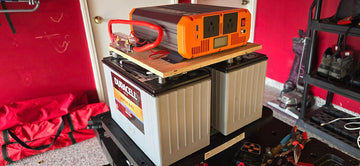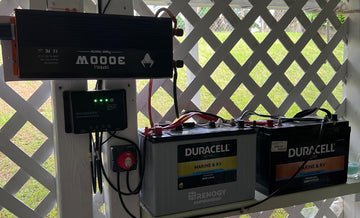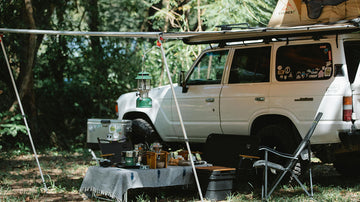Don't be alarmed if you notice corrosion around your battery terminals, it's normal. However, over time, corrosion on the battery terminals can damage the battery cables. It can also cause sparking, which can damage the battery terminals and, in the worst case, cause the battery to rupture. The good news is that by understanding the causes and learning how to clean and prevent battery terminal corrosion, you can avoid this common problem. In this article, we'll look at the causes of battery terminal corrosion and then give you steps on how to clean and prevent it.
What is battery corrosion?
When the battery is running, the sulphuric acid releases hydrogen gas. The gas then mixes with the ambient air. The chemical reaction that occurs when the hydrogen gas comes into contact with air, moisture and salt causes corrosion.
Battery corrosion can manifest itself in a number of ways. The most common is the formation of a scaly or brittle substance around the battery terminals, cables or posts. This material is usually white, light blue, green, grey or brown in colour. It has a granular, powdery texture. The colour will vary depending on the type of battery.

Effects of terminal corrosion
Corrosion on or around the surface of the battery can cause an increase in the internal resistance of the circuits, which can interfere with the flow of current, resulting in a loss of power and affecting vehicle performance. In cases of severe corrosion, the battery may not be able to provide sufficient power, which means that your equipment or vehicle may not start.
Regular cleaning and maintenance of corroded battery terminals is a must to keep your car running smoothly and extend the life of your battery.
Causes of battery corrosion
Battery corrosion can be caused by a number of factors. Understanding the causes and the chemistry behind corrosion can help you better prevent it and maintain optimal battery performance.
Battery damage or leakage
A damaged or leaking battery can cause electrolyte to build up on the terminals and acid to come into contact with the copper wires of the battery leads, causing corrosion.
Undercharged batterie
Undercharged batteries are often the cause of corrosion on the negative terminals of a car battery. This can happen if the car has not been driven for a long enough time and the battery has not been charged sufficiently.
Poor battery contact
Terminal corrosion can occur if the wires connecting the terminals are loose or corroded. Any loose connection means too much resistance, making it harder to charge and discharge the battery. Increases the risk of battery wear and gas leakage.
Running electrical components with the engine off
This is one of the main causes of car battery failure. Electrical components in today's cars use more current. If the engine is not running and the radio is left on, this puts a strain on the battery. Eventually, this will lead to problems with battery charging.
Overloading and high temperatures
Most batteries work best at temperatures around 70 degrees Fahrenheit. If the temperature is too low or too high, the battery may lose performance. Corrosion usually occurs when the weather gets warmer because the water in the battery fluid evaporates faster, causing damage to the battery grid. This problem is most likely to occur if the battery in the car is more than three years old.
Battery corrosion can be a direct result of overcharging. Overcharging a lead-acid battery filled with water can result in high temperatures and boiling sulphuric acid. Not only does this cause a build-up of excess gas, but it can also lead to severe corrosion of your car's battery terminals.
Failure to check water level
Most car batteries are not sealed and some of the distilled water in the battery is lost over time. As a result, it is sometimes necessary to add more distilled water. Many car owners don't realise that this needs to be done as part of their car's maintenance schedule.
Faulty alternator
The alternator can cause the battery to overcharge slightly. When this happens, the temperature inside the battery rises, causing the internal electrolyte to expand and more acidic gases to be released through the vents. These gases then come into contact with the terminals and start the corrosion process.
How to clean battery corrosion?
To ensure efficient and safe operation, the following tools must be available:
✔ Acid resistant rubber or nitrile gloves
✔ Goggles
✔ Wire brush
✔ Baking soda and water
✔ Rag or paper towel
✔ Battery removal tools

Handling battery acid is dangerous and the powdery deposits around the battery terminals are corrosive. Wear gloves and goggles for safety. If corrosive material accidentally gets on to skin or clothing, wash off immediately.
Step 1: Disconnect the battery, first the negative cable and then the positive cable. Disconnecting the battery ensures safety and prevents accidental discharge that could damage the car's electrical system. Place the cables safely away from the terminals.
Note: Before disconnecting the battery, use a battery memory protector to save stored data and protect the car's electrical system. Always refer to your vehicle owner's manual for specific information on using the battery memory protector to prevent data loss and damage to the electrical system.
Step 2: After disconnecting the battery, take a moment to inspect the cables. Check for abrasion or corrosion where the cables connect to the terminals, and for dry or cracked insulation. Any damaged cables must be replaced.
Step 3: Remove the battery and use a wire brush or scraper to remove any solid powdery corrosion from around the terminals and dirt from the top of the battery case.
Step 4: Baking soda and warm water are good neutralising solutions for removing battery corrosion, mix ½ teaspoon of baking soda with 250ml of water. Dip a cloth into the solution and wipe away the corrosion, rather than pouring the solution over the top of the battery. This is to prevent the solution from getting into the battery cells and neutralising the sulphuric acid inside. Don't forget to clean the terminals that connect the battery to the cables. You can do this by dipping the terminals in a solution of baking soda and water.
Step 5: After thoroughly cleaning the terminals, remove any cleaning solution residue with water. Make sure you do not just clean around the terminals and lead contacts. Also clean all areas around the battery to remove any corrosion. Failure to do so may result in damage to the battery and other areas of the engine.
Step 6: When clean and dry, place the battery back in the engine and reconnect it to the battery terminals. This time connect the positive terminal to the cable first, then the negative terminal. Remember to ensure that the nuts and bolts on the cables are fully tightened.
How to avoid battery corrosion
1️⃣Protective coatings: After thorough cleaning, special coatings (dielectric grease, Vaseline, anti-corrosion spray) can be applied to the battery terminals and posts. Always ensure that the battery cables are disconnected before application.
2️⃣Avoid overcharging or undercharging: If your battery is overcharged, take your vehicle to an automotive technician who can check for electrical problems. Undercharging can occur when the battery does not receive enough charge to bring it back to full capacity.
3️⃣Regular checks: It's always a good idea to take your vehicle in for regular electrical troubleshooting. Taking the time to check the condition of the battery and its associated components will help to identify corrosion problems early and prevent them from getting out of hand.
Say goodbye to battery corrosion: switch to lithium
The use of lithium batteries avoids the terminal corrosion problems associated with traditional lead-acid batteries, and lithium batteries have a number of advantages:

No battery acid leakage
Many typical lead-acid batteries are designed to be opened, or at least vented. This is necessary to allow the chemical reaction to release the gases produced during charging. However, lithium batteries use a solid electrolyte rather than a liquid electrolyte, eliminating the risk of harmful leaks.
No acid fumes
Lithium batteries do not produce acid vapours, so no harmful acid compounds are released during use. The sealed nature of lithium batteries means you never have to vent or release fumes, reducing the risk of damage to your equipment and electronics.
No maintenance required
With standard lead-acid batteries, you need to charge and recharge them every few weeks or months to ensure they continue to work as they should. Lithium batteries, on the other hand, require little or no maintenance. This means you can save time and energy by not having to regularly check the condition of your battery terminals or perform additional maintenance.
FAQ
Q: Does corrosion mean a bad battery?
A: Not necessarily, but it means that the battery may be faulty or damaged and not working properly. Corrosion found on a battery needs to be cleaned immediately, if it is allowed to build up the battery will not work as it should. It is normal for lead-acid batteries to show corrosion, so they are not ideal for deep cycle applications. For RV, marine and off-grid systems, lithium batteries are a superior and safer choice.
Q: Can battery corrosion damage electronics?
A: This can happen. Severe battery acid leaks can erode circuit boards and components inside electronic products, causing open circuits, short circuits or other malfunctions. For this reason, it is important to prevent battery corrosion in expensive or sophisticated electronic equipment. If an electronic product has been damaged, it may be necessary to repair or replace the affected components to prevent further damage and ensure proper operation of the equipment.
Q: How long does it take for a battery to start corroding?
A: The time at which a battery begins to corrode depends on a number of factors, including the type of battery, conditions of use, storage environment and maintenance. Alkaline batteries start to leak after about 5 or 6 years, especially at higher temperatures (e.g. 80 to 90 degrees Fahrenheit). The active chemical is potassium hydroxide, which is very corrosive and can slowly eat away at plastic seals.

















